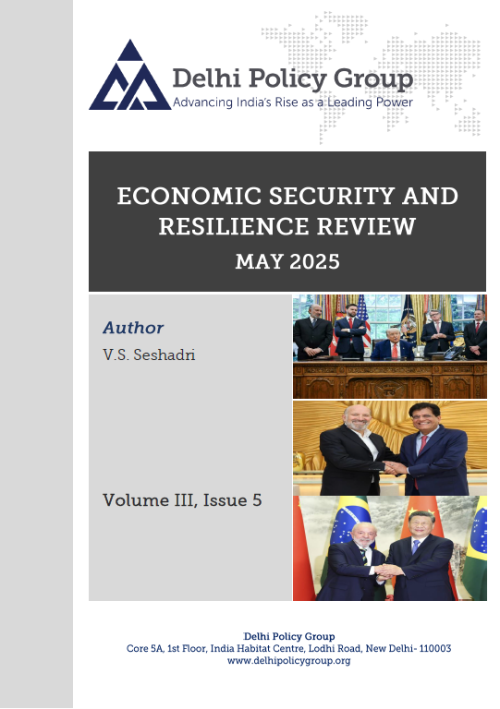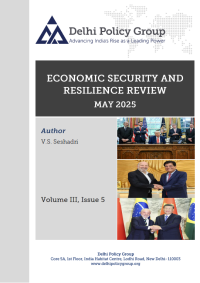Economic Security and Resilience Review
Date: June 04, 2025
In this issue, the author examines how the trading world is coping with the challenges posed by the reciprocal tariffs plan of US President Trump. While the UK has secured an interim deal, and China has reached a temporary truce with the US, negotiations between the US and another dozen or so countries, including India, are continuing. With the 90 day pause for the reciprocal tariffs beyond the half way mark, there is still no clarity on how these remaining deals will be structured or concluded.
India is keeping up the momentum of discussions on the India-US BTA, while also widening its engagement on FTAs with other trading partners. During the month, the India-UK FTA was concluded and negotiating rounds held with the EU, Chile and New Zealand. Progress could help mitigate the adverse impact from the increasing uncertainties in the global trading environment.
This issue draws attention to new problem areas in India’s trading ties with China: the imposition of high levels of anti-dumping duties by China on India’s exports of the insecticide cypermethrin, and difficulties being faced by the Indian automotive sector in accessing supplies of rare earth magnets from China.
The month saw two significant developments in Europe, with a simplified version of the carbon border adjustment mechanism (CBAM) being processed for final adoption by the EU, and the first EU-UK summit after Brexit signalling closer economic alignment on standards, CBAMs and economic resilience.
Finally, this issue highlights China’s continuing efforts to enhance cooperation with Latin American and Caribbean countries, including under the BRI umbrella, which were in evidence at the fourth China-CELAC ministerial meeting held in Beijing and Brazilian President Lula’s state visit to China.
To read this issue of the ESRR, Vol. III, Issue 5, please see the PDF attached
India is keeping up the momentum of discussions on the India-US BTA, while also widening its engagement on FTAs with other trading partners. During the month, the India-UK FTA was concluded and negotiating rounds held with the EU, Chile and New Zealand. Progress could help mitigate the adverse impact from the increasing uncertainties in the global trading environment.
This issue draws attention to new problem areas in India’s trading ties with China: the imposition of high levels of anti-dumping duties by China on India’s exports of the insecticide cypermethrin, and difficulties being faced by the Indian automotive sector in accessing supplies of rare earth magnets from China.
The month saw two significant developments in Europe, with a simplified version of the carbon border adjustment mechanism (CBAM) being processed for final adoption by the EU, and the first EU-UK summit after Brexit signalling closer economic alignment on standards, CBAMs and economic resilience.
Finally, this issue highlights China’s continuing efforts to enhance cooperation with Latin American and Caribbean countries, including under the BRI umbrella, which were in evidence at the fourth China-CELAC ministerial meeting held in Beijing and Brazilian President Lula’s state visit to China.
To read this issue of the ESRR, Vol. III, Issue 5, please see the PDF attached



